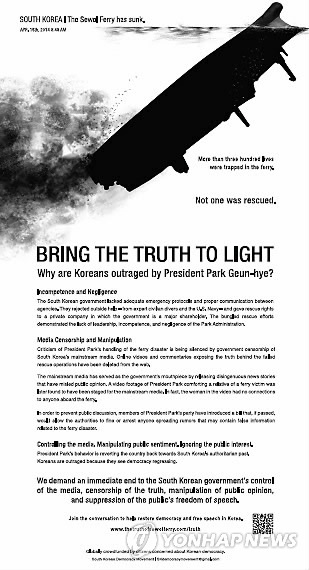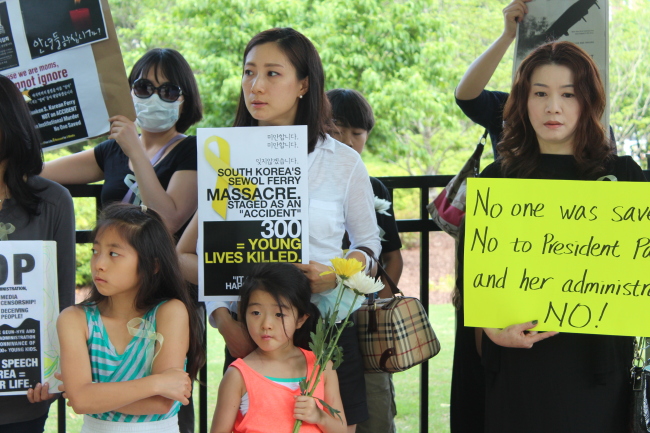Koreans have been placing ads in the NYT in recent years to draw international attention to politically sensitive issues, such as the dispute over the Dokdo islets, and to promote the country’s cultural heritage. The Sewol ad was the first case of Korean-Americans expressing anger against the Park administration.
They said in the ad that Koreans were outraged by President Park, but said that the criticism was being “silenced by the government censorship of South Korea’s mainstream media.”
It also claimed that Park’s encounter with a woman at the memorial altar on April 29 was “staged” by the media, adding that the woman was later found to have no connection to the victims’ families.
Controversy has been escalating here over Park’s suspicious meeting with the woman. Both Cheong Wa Dae and the woman, however, denied the allegation that the meeting was prearranged.
“We demand an immediate end to the South Korean government’s control of the media, censorship of the truth, manipulation of public opinion and suppression of the public’s freedom of speech,” it said.
“Park’s behavior is reverting the country back toward South Korea’s authoritarian past. Koreans are outraged because they see democracy regressing,” it added.
The ad, however, was met with criticism from other overseas Koreans in and out of the U.S.
The Association of Korean Residents In Europe on Monday expressed regrets over the NYT ad, saying it is “unpardonable if the project was aimed at politicizing the tragedy and dividing the public.”
“We cannot help but express concerns over some Korean-Americans placing an ad in The New York Times that denounced the Korean government and misled the public,“ the association said in its statement.
Lee Chong-soon, head of the Federation of Korean Associations in U.S. also said she would release a statement soon to refute claims carried out on the ad.
The NYT ads came at the critical time when Park and her government are facing mounting public criticism. Disputes have been escalating here over her first apology carried out in the middle of a Cabinet meeting on April 29. Victims’ families protested against the president, saying her apology was reluctant and informal. The media also criticized the South Korean leader not holding herself responsible. The main opposition party also accused her of lacking sincerity.
Amid growing controversies, Cheong Wa Dae said Sunday that the president will deliver an address this week to apologize for the Sewol ferry disaster. She will also announce her master plan to enhance national safety and put an end to corrupt practices between officials and businesses, presidential spokesman Min Kyung-wook said.
The plan came after the president convened an emergency meeting with presidential secretaries on Sunday morning. The meeting was organized to discuss follow-up measures to the disaster, Min said.
The president is also expected to officially hold herself responsible for the disaster. Park’s previous apologies sparked public outrage because she attributed faults that led to the disaster to officials in charge of safety and maritime affairs, without acknowledging her responsibility as the leader of the country.
By Cho Chung-un (
christory@heraldcorp.com)





![[Herald Interview] 'Trump will use tariffs as first line of defense for American manufacturing'](http://res.heraldm.com/phpwas/restmb_idxmake.php?idx=644&simg=/content/image/2024/11/26/20241126050017_0.jpg)

![[Health and care] Getting cancer young: Why cancer isn’t just an older person’s battle](http://res.heraldm.com/phpwas/restmb_idxmake.php?idx=644&simg=/content/image/2024/11/26/20241126050043_0.jpg)

